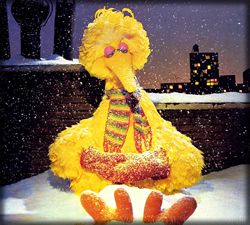The Taoist concept of "Yin and Yang" refers to the interconnectedness of lightness and darkness. One cannot exist without the other. While this concept had been expanded by other cultures to involve similar dichotomies (good/evil, positive/negative), the core idea that both qualities must exist is essential.
Big Bird could not exist without Oscar the Grouch. Oscar could not exist without Bird. And neither could exist without Caroll Spinney.
Light, dark, and the bond that holds them together.
Born on December 26, 1933 (Happy 79th Birthday!), Caroll was so named because it was so close to Christmas. Like a traditional song, Caroll grew up to be one of the most reliable and trustworthy people to ever go into entertainment. Caroll's interest in puppetry led him to perform on Bozo's Big Top where he showcased his original puppets, Picklepuss and Pop.
The revamped, Muppetized-versions of Picklepuss and Pop that Spinney later revisited.
Henson admired his work, and asked him for the role on the upcoming Sesame Street. Spinney wasn't sure what he was getting into, but one does not say no to Jim Henson without a lifetime of regret. Spinney ended up portraying two characters that would immortalize him forever. Unlike other Muppet performers, who had a handful of signature characters (and played dozens more), these two were all Spinney needed, and it could have worked out more perfectly.
One was a dim-witted giant, small-headed, yellow bird who would play the fool to the humans on the street (both children and adults alike). The other was an orange, trash-can dwelling monster who would antagonize the neighbors. Both characters rapidly evolved into the Big Bird and Oscar we know today, but there was more than just a change in the puppets' appearances.
Eventually, it was decided that having the puppeteer visible was just to unsettling.
Oscar, as we know, was based on a child's tendency to be moody, self-centered, and complaining. Armed with the voice of an unfriendly cab-driver that Spinney witnessed on the way to the studio, Oscar represented all that was wrong with life. His pessimistic attitude rained on every pleasant occasion, and only the unwanted and disgusting elements of life gave him pleasure. This may sound unbearable, but frankly, having someone playing devil's advocate to the bright, sunny world of Sesame Street allowed for intelligent conversations and observations.
We love you, you grubby, filthy, ill-tempered beast!
Big Bird, meanwhile, became less of an imbecile and more of a child. He lacked knowledge, but he was curious and encouraged other children to persevere. He became the face of optimism, always ready to sing and be merry. As a result, troubling instances, such as death, unexpected changes and destruction, would hit even harder for the bird, showing that producers were aware of how to approach sensitive topics.
Big Bird ponders his own existence.
The fact that both of these characters are such permanent fixtures to the show is no mystery. At times in our lives, everyone can identify with Oscar and everyone can identify with Big Bird. Both even have their own fan clubs (the Grouchketeers and Birdketeers respectively), implying that neither character is inherently "better" than the other. If the world were black and white, Big Bird would be the hero, Oscar the villain, and that would be final. But both need to remain on Sesame Street to give the show its necessary depth.
In 2003, Spinney wrote an autobiography explaining what he has learned about life through the viewpoints of these two characters. It's called The Wisdom of Big Bird (and the Dark Genius of Oscar the Grouch) and is well worth your time.
Although we rarely see the man behind these characters, it is clear that he is a wonderful human being. He has landed one of the best jobs in the world and, at 79, he still feels like a kid every day. In 2013 a documentary titled I Am Big Bird shall premiere, and judging by the trailer, life behind the scenes is just as magical as life in front of the camera.
At a time when all other original puppeteers are retiring, he is remaining strong, vowing to continue playing these characters "as long as [he] can keep [his] hand in the air." Happy Birthday to this wonderful legend, who reminds us to embrace our inner grouch and our inner child.
A hero in bird's legs.

















































